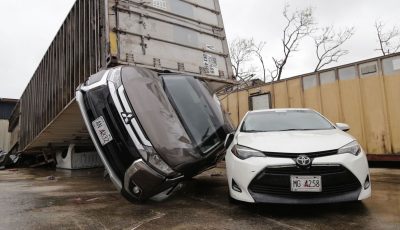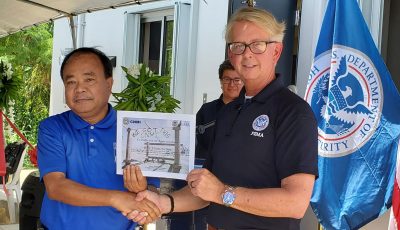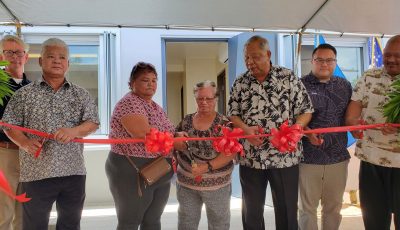TO SUPPORT LONG-TERM REBUILDING
CARE requests $250K from SNILD
The Commonwealth Advocates for Recovery Efforts on Monday requested an immediate initial investment of $250,000 from the Saipan and Northern Islands Legislative Delegation to support long-term, resilient-building solutions for Saipan families still with unmet housing needs as a result of Typhoon Soudelor. The request was made during CARE’s presentation on the status of ongoing long-term recovery efforts to SNILD in the House chamber.
“The unmet housing need for many victims of Typhoon Soudelor is still significant,” said CARE president Alex Sablan. “Too many Saipan families still have home repair needs or need to completely rebuild their homes, but have received insufficient FEMA (Federal Emergency Management Agency) aid or no aid at all and cannot meet the expense of rebuilding a safe, sanitary, and functional home on their own.”
According to case management data as of March 6, 2016, 524 families on Saipan still have unmet needs for housing repairs or the complete rebuilding of their homes. Many of these families are still going through the FEMA appeals process, and once that process is exhausted their cases will be presented to the CARE Unmet Needs Table for assistance. To date, CARE has received 40 case referrals and has allocated $103,500 in resources toward long-term rebuilding.
“It has been over seven months since Soudelor, and some families are still living in emergency tents,” said CARE director Jenny Hegland. “Unfortunately, many of these families simply have nowhere else to turn for help.” Case management data reveals that 477 (91 percent) of the 524 households with unmet housing needs have a family member that is elderly, under 3 years old, with functional or immediate medical needs, or the family’s income is below the poverty line.
CARE’s request for $250,000 in immediate assistance to help fund reconstruction efforts is the first part of CARE’s total request of up to $5 million from SNILD. The total request, originally made via letter on Feb. 18, 2016, is part of a multi-agency, two-year plan to finance home repairs and reconstruction for those with unmet housing needs following Typhoon Soudelor. Working with case managers, project coordinators, and resource managers through the FEMA-funded, long-term case management program, CARE would facilitate the allocation of construction resources to meet the unmet housing need through processes established and currently operating through the CARE Unmet Needs Table. The unmet housing need is slowly decreasing as clients receive additional FEMA aid through appeals, and as CARE allocates rebuilding assistance. CARE estimates that the total unmet housing need following Soudelor as of March 6 is just over $12.1 million, which is about an 11-percent decrease from the unmet housing need cost estimated in early January.
“Any investment by SNILD will allow CARE to leverage up to an equal amount’s worth of additional resources, including skilled volunteer labor from off-island disaster recovery partner agencies,” said Sablan. CARE intends that the initial $250,00 investment would be used to facilitate the transportation and supplying of an initial wave of skilled volunteers to do home repairs and rebuilds. “We have an immediate need for off-island construction support as victims of Super Typhoon Soudelor, Red Cross IDCM case workers, and members of CARE have been unable to locate or access needed on-island construction manpower to assist typhoon victims due to the current construction boom and a severe shortage of local construction expertise. Identifying and financing the labor costs is the single largest hurdle between building a more resilient community with safe housing stock that can survive the next typhoon, and where we are now. This is an investment that SNILD can make not only for these families, but to improve the resiliency of our whole community.”
CARE is helping to build a more resilient community by facilitating coordination between network partners, business and government leaders, and community volunteers, identifying unmet needs, and delivering long-term support to those most impacted by disaster. For more information, go to www.cnmicare.com.



























